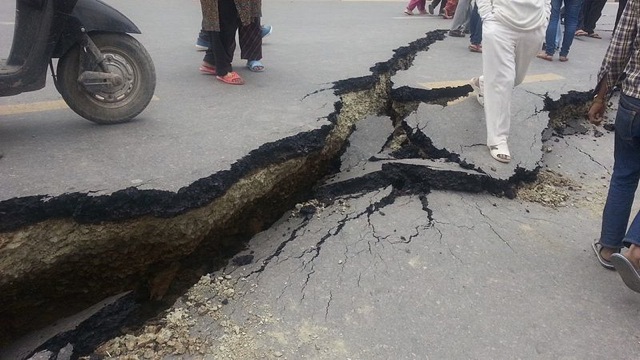
Our screens have been filled with tragic images of the ruin and destruction brought to Nepal by the earthquake on 25th April – and the unfolding tragedy of lives lost, homelessness on a mass scale, and precious cultural heritage reduced to rubble.
Natural disasters are just a normal part of life on fallen planet earth. There are between 10 and 20,000 earthquakes a year worldwide. But many of these are minor. For the last 10 years there have been 10 and 20 earthquakes of magnitude 7 and above. This year so far only 4. But it is where they strike that makes the difference between a minor paragraph on page 3 and a dominant news story for days.
Of course the first thing that Christians will want to do is what the Spirit urges us to do: to pray that God and his people would draw near to comfort, heal and help; and to generously support in any way we can with the relief effort. These are instincts that should be woven into the fabric our our lives as disciples of Jesus.
But still, some people demand answers from us: here, for what it’s worth, is what we think we might try to say.
It’s natural that suffering like this makes us question very deeply whether there is a God, and what He is like. That’s because we instinctively think suffering is “wrong” and a “problem”, even when it happens to people we’ve never met. What is strange to think is that if there is no God, then our feelings that suffering is “wrong” have no basis; suffering is just what happens to happen to some people who happen to be in the wrong place at the wrong time. As long as we’re OK, it doesn’t really matter.
But if there is a God, and since there is suffering, then our feeling of “wrongness” actually make sense. Something has gone very wrong, either with God or with the world. And God in the Bible says that it’s the world that has gone “wrong”. It is less than the very good world he made, and this has had catastrophic consequences.
Jesus gives uncomfortably clear answers to why the world has gone wrong, and the significance of suffering. But actually, answers are usually what people watching from half a world away demand. What people in the middle of suffering want and need is practical help and long-term hope. Not an answer for the suffering; but a hope beyond the suffering.
Again, atheism has no hope for the injured, the destitute, the bereaved. Many religions (including Hinduism and Buddhism, the main religions in Nepal) don’t either. But Jesus does.
Through his suffering and death on the cross, we can be confident that one day, there will be no suffering. There’ll be no pain, or even death. Because of his resurrection, we can be confident that suffering and death do not have the final word. The end of the story is not a shattered world, but a remade world through Jesus—a world perfectly for people to enjoy, “and he will wipe every tear from their eyes”. God will dwell in this world, and His presence will guarantee its perfection (Revelation 21 v 3-4).
That’s a world open to anyone, simply by asking God-made-flesh—Jesus—to give them a place in it. That’s hope; and the people who have suffered far more greatly than we have, need hope more than they need a neat pre-packaged answer.
Some useful resources:
If I were God I'd end all the pain
The World we all want
Is God really in control?
How Long, O Lord?
Title Photo: Krish Dulal, Wikimedia Commons, used under CC licence
Joel Omale
All you've written would just begin to make a semblance of sense if mostly Christian regions, like the United States, didn't have natural disasters.
This exactly what Christianity does to people: making them antipathic to, heartless, disinterested in, and innured other people's sufferings, because they're (Christians) 'the chosen generation' or, more stupidly, 'God's people'.